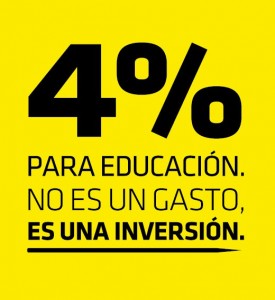
Since November there has been a debate in the Dominican Republic about the quality of the education. The debate has focused on a significant item contained in the General Law of Education that refers to an amount of money that should be invested annually in the education sector. In effect, Law 66-97 [es], in its article 197, establishes that the annual public expense on education should at least match 4% of the Gross Domestic Product (GDP), but in reality it has been sometimes less than 2%.
Being the case that the Dominican Republic almost always occupies one of the bottom rankings [es] in studies on the quality of education in Latin America, a nonprofit organization called Coalición por una Educación Digna [es], which means Coalition for a Worthy Education, has focused on the matter by referring to education as an investment rather than an expense. The consequence has been that since the first days of November there have been several protests in various parts of the country. The first one was in the capital Santo Domingo, where the President and Congress are based.
The debate, which has been the top story in newspapers, television and radio, also appeared on the Web 2.0, where signs of support for the 4% GDP commitment have been seen on blogs and social networks, especially Facebook and Twitter. Even Dominicans residing in New York and Madrid [es] have shown their support for the movement in the understanding that a good education is the foundation for future development and prosperity. The blog Ponte Nístido [es] briefly recounts the protests in Madrid:
El movimiento dominicano del 4% llego a las tierras madrileñas donde dominicanos tambien exigieron al gobierno el 4% a la educacion, lo hicieron frente a la Embajada Dominicana en Madrid.
The movement's demand for 4% of GDP for education in reality began much earlier than November. In September, a video made the rounds on the Internet that explained the education realities in the Dominican Republic, and compared the situation in other nations. The video, which was even shown on television, also presented the correlation between poor education and high levels of delinquency and poverty. The movement was just building momentum by the end of October and by the end of November there were large numbers of hats, umbrellas, shirts and stickers calling for the 4%.
The color yellow has become the symbol of the campaign, so much that during December several lunes amarillos [es] (Yellow Mondays) were realized: protests were carried out in front of Congress and other strategic points to demand the fulfillment of the law with respect to education. Yellow Mondays began on the 6th. The second week of December, the Chamber of Representatives held a session to approve the proposed Budget for 2011, but like on previous occasions it allocated significantly less than the 4% of the GDP for education. In other words, it wasn't an exception to the trend of ignoring the 4% mandate. Towards the end of the session, the representatives of the opposition protested openly in support of the campaign for the 4%, and the budget was not be approved. It was sent to a special commission to study if the budget is compliant with the law.
There were very similar events during the second week of December. Since the 2011 Budget items were defined, the government has been consistently saying that it cannot honor the 4% mandate because it doesn't have enough sources of funding. Nonetheless, and probably due to the pressure exercised, the President of the Republic held a meeting to discuss the subject with the Coalition for a Worthy Education and other sectors of the social and education spectrum. By the end of the meeting the head of state laid out a plan to increase the budget item for education to 10 billion Dominican pesos (approx 271 million USD), raising the total amount invested to approximately 2.75% GDP. In a similar manner this would lead to a gradual increase across several years. However, the proposals have been rejected by groups demanding the 4%.
The are divided opinions on the 4% campaign. Though it would be best if the majority of people agreed, there are those who think that a group of politicians from the opposition is behind this [es], while several commentators agree with the President when he says that a good in Education is much more than money and that proof of this abounds. The report PISA and the situation in Great Britain has been mentioned [es] shows that the education investment has increased considerably but its scholastic performance has continued to be ranked as one of the lowest in Europe. Others, such as José Ernesto Devárez (hijo) [es], from the blog Ahiqueprende, acknowledge that the President is right on this point, but still deplore the current state of education in the country:
Sin embargo, en algo sí estoy de acuerdo con el Dr. Fernández: a la hora de encarar la problemática de nuestro sistema educativo, el dinero no lo es todo. Barnizar con fondos la actual situación sin previamente definir una estrategia a seguir sería un error monumental. Sería como buscar extinguir un incendio utilizando el personal, los equipos, el camión, y los agentes incorrectos. La situación se agrava si no disponemos de un plan definido. Esto solo me suena a un potencial despilfarro de dinero…







1 comment
Any investment in education will help the country to boost its productivity and lower the crime rate soon or later.